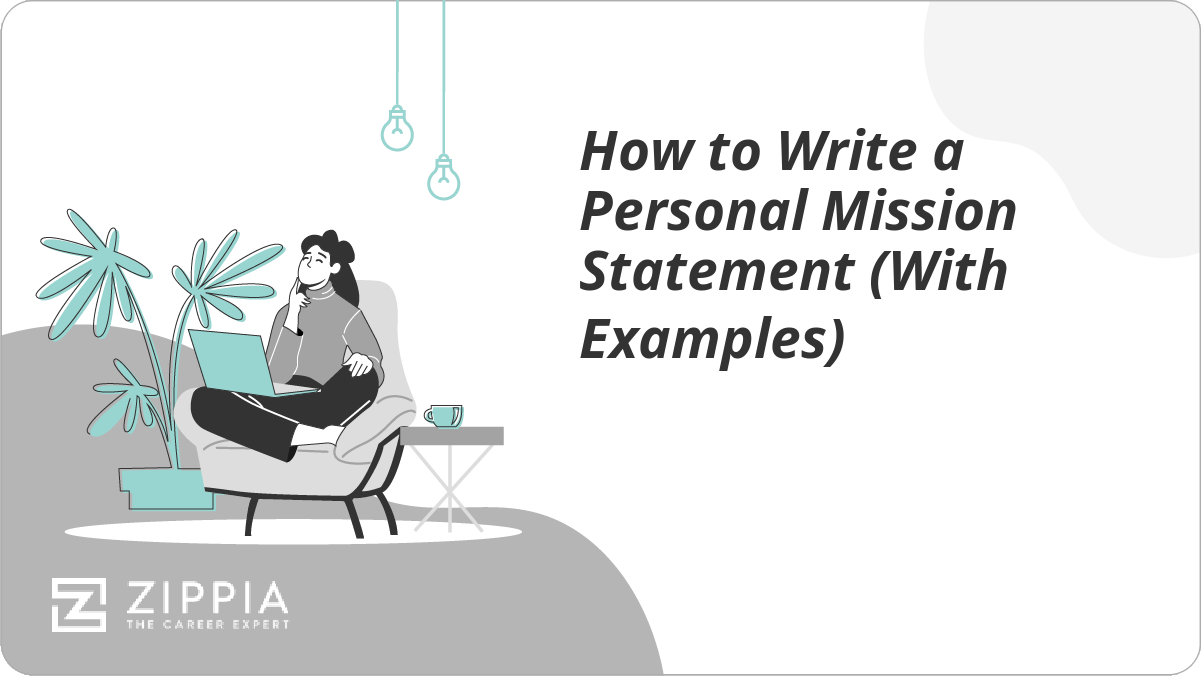- Application
- Email Communication
- Letter Communication
- Follow Up
- Job Application Tips
- About Me Page
- Answering Machine Messages
- What To Bring To A Job Fair
- Free Job Posting Sites
- Email Sign Offs
- Job Scams
- How Long Does It Take To Become A Doctor
- How Long Does It Take To Become A Vet
- Government Programs That Help Felons Get Jobs
- How Long Does It Take To Become A Dentist
- Relocation
- Job Search Spreadsheet
- Right To Work States
- How To Research A Company
- How To Change Careers
- What To Do If You Have No References
- Working For a Big Company Vs. A Small Company
- Writing Sample Format
- How Long Should A Writing Sample Be
- How To Get A Job Fast
- How Many Jobs Should I Apply For
- Military Requirements
Find a Job You Really Want In
- How to Write a Personal Mission Statement
- Personal Mission Statement Template and Examples
- Tips for Writing Your Personal Mission Statement
- What Is a Personal Mission Statement?
- Why Is It Important to Have a Personal Mission Statement?
- Where Can You Use a Personal Mission Statement?
- Sign Up For More Advice and Jobs
Like corporate mission statements, personal mission statements are short overviews of why you do what you do, and they can be effective ways of helping coworkers or potential employers get to know you. They can also focus your work and decision-making, so it’s important to spend some time thinking through your personal mission statement.
In this article, we’ll go over how to write a personal mission statement, some examples of these statements, and how having a personal mission statement can help you at work.
Key Takeaways
-
A personal mission statement should be one sentence long.
-
Your personal mission statement communicates the “why” behind your work.
-
Having a personal mission statement will help you decide what to prioritize and will help you introduce yourself and your values to employers.

How to Write a Personal Mission Statement
If you’re having trouble coming up with a personal mission statement, you’re not alone. Though it seems like a simple sentence, personal mission statements contain a lifetime of experience, knowledge, and even soul-searching when done correctly.
Once you get the hang of it, you’ll find that crafting your own personal mission statement can be not only fun but illuminating. It can help you to identify and clarify the values that have been driving your working life. Here are some steps you can take to write a great personal mission statement:
-
Brainstorm on your work and life missions. As we’ve discussed, personal mission statements are deceptively compact, and these short statements contain a ton of information on how you navigate the working world.
For many people, we’ve never actually taken the time to think through our views on work and on life in general, or how these views intersect. Take the time to think this through and write down whatever comes up.
What is your view on life and your purpose within it? What is your opinion on work and your goal within it (not just what you do to make money, but anything you do to engage yourself in the human project)? These are huge questions, to be sure, but brainstorming your answers can help make it clear why you do what you do.
-
Identify your core values and goals. Read through your brainstorm journals, and highlight anything that sticks out to you as one of your key motivating values. This could be anything that drives you to do what you do in this world.
Perhaps you want to help people live safely and comfortably. Maybe you want to expand human knowledge or artistic possibilities. Perhaps you want to make people, or just one person, smile. The possibilities are endless, and it’s all your decision based upon what particular thing you feel called to do in this lifetime.
Once you’ve got your fundamental values, examine how these align with your personal and professional goals. Think about where you would like to be in your career and what you would like to achieve. Also, think about what type of person you want to be and what you want to do for your community.
-
Recognize the skills you’ll use to enact your values. Each of us has special skills, both professional and personal, that we can use to achieve our goals. Mentioning these skills in your personal mission statement not only gives you an extra chance to show off your strengths but demonstrates that you are determined to use this skill proactively.
Are you creative, a natural teacher, empathetic, great with numbers, or a skilled organizer? Determine what your strengths are and how you utilize these strengths.
-
Edit for maximum impact. They say the key to excellent writing is packing as much information into as few words as possible, which holds true for a great personal mission statement. Your personal mission statement should be short, sweet, and to the point for maximum effectiveness.
Edit your personal mission statement to be as concise as possible. Use colorful, inspiring verbs and impactful, concrete nouns whenever possible. You don’t need to include any specifics in your statement; that’s what your resume and cover letter are for.
-
Discuss with peers and mentors. Finally, if you’re still not sure how to write a mission statement acceptable for your contextual purposes, discuss it with your colleagues or professional mentors. You can ask about their personal mission statements, or just for a second pair of eyes on yours.
Even if you do come up with a great statement on your own, talking it over can be beneficial for multiple reasons. You’ll not only be able to get some feedback and inspiration (which is always helpful), but you’ll be opening a dialogue with those around you, which can help you understand and work with them on a deeper level.
Personal Mission Statement Template and Examples
Personal Mission Statement Template
Your personal mission statement will have to be modified for grammar and syntax based on where and how it is used, but a great personal mission statement will address all of the following points in a single sentence:
-
What action(s) will you take to affect change?
-
What skills will you use?
-
What community or group of people will be affected?
-
What change do you wish to affect/ what result do you want to have?
It could look something like this:
“To use [skill] to [verb describing your work] [community affected by your work] [desired result of your work]”
However, please keep in mind that this is entirely personal and contextual. If it ends up sounding awkward, you can always rephrase out and take out any parts you like. You can even simplify it to only your desired impact or result.
Personal Mission Statement Examples
-
To use my creative talents to teach inner-city high schoolers about the ways that art can uplift their spirit and change their perspective.
-
To bring joy to those around me.
-
To write stories that remind us of our humanity.
-
To use my writing skills to increase nonprofit funding and create a more equitable world.
-
To create a new era of marketing focused on ethics, sustainability, and transparency.
-
To engineer commercial products that make our lives easier and better.
-
To bring comfort and attentive care to patients at the end of their lives.
-
To be happy, healthy, and do no harm.
-
To create innovative technology that changes the way we live our lives.
-
To help women of color find success in corporate positions through one-on-one, intersectional consultations.
-
To never stop learning.
-
To create software that enhances user security with a streamlined process.
-
To inform policies that will tackle the climate crisis head-on and save the planet.
-
To give my clients beautiful, easy-to-use web pages that will help them expand their online businesses.
-
To use my talents to invest in my community.
-
To serve as a mentor, apply my values to every decision, and make a difference in people’s lives.
-
To fight until every child has a free and fair chance at education.
-
To use my unique gifts.
-
To keep people informed on global issues and create a more connected world.
-
To foster a more accessible world with disability-conscious designs.
-
To create and record beautiful wedding memories for my clients.
-
To help those around me grow in their talents and use them to better the world.
-
To provide excellent care to every patient every day.
-
To bring beauty to the world around me.
-
To make every child feel like the most important person in the room.
-
To help my clients live the fullest, healthiest lives possible.
Tips for Writing Your Personal Mission Statement
Here are some final tips for crafting your perfect personal mission statement:
-
Be brief. Keep it as concise as you can in a single, straightforward sentence. It should be easy to remember and immediately clear. If you’d like, you can even narrow it down to three words representing the essence of your statement and sparsely add in words for clarity.
-
Be honest. The worst way to write a personal mission statement is to say what you think others want to hear, regardless of whether you believe it. Your statement should be a genuine reflection of you, and if it isn’t, it doesn’t serve much of a purpose.
-
Be open. If you are cynical, be open to the process. It’s okay if this doesn’t turn out to be the best way for you to express yourself, but it can still help figure out what drives you on your deepest level.
Being vulnerable about our deepest drives, motivations, and values can be scary. This is because we’ve been told so often in our lives – both directly and indirectly – that the things we want and value are wrong, or they don’t matter.
However, being open with those in your life in this way can be an incredible tool of connection. Who knows, you may even be giving someone else the freedom to express themselves in the same way. This is where the world-changing possibilities of mission statements can come into play.
-
Be teachable. Your mission statement can feel highly personal, so it can be difficult to ask for feedback on it. However, you need to have someone you trust read it to check it for errors and to make sure you’re communicating clearly and effectively.
When they do give you feedback, take it graciously and remember that it isn’t a personal attack — they’re just trying to help you.
What Is a Personal Mission Statement?
A personal mission statement, sometimes called a vision statement, outlines your deepest purpose for working. It gives a quick synopsis of your goals and values in your working life, and it can help you make decisions that align with your purpose.
Personal mission statements are typically in the format of a single sentence or short phrase that shows how you define yourself as a person and a member of an organization. It shows, quickly, how and why you work.
Personal mission statements can be used in a variety of ways, both for your own personal benefit and as a way of helping others get to know you. They can be used on resumes, college applications, professional social media profiles, and more.
Even just keeping this statement in mind can help radically shift the choices you make in your work life. This is because personal mission statements also act as a guide for our behavior. Figuring out the right choice in any area of life can be a difficult and time-consuming task, but with your mission statement in mind, the right choice might be a little bit clearer.
Why Is It Important to Have a Personal Mission Statement?
Personal mission statements are important because they can help with the enormous task of figuring out your deepest purpose for your work life and choices.
We get it; you may be thinking, “my deepest purpose for working is to make money and survive,” and that’s perfectly fair. You do need to make money to survive in this world, and we aren’t discounting the strong influence that can have on the career decisions you make.
However, the point of a personal mission statement is to, in a small way, carve out the life you want for yourself and the world you want to create. Your personal mission statement isn’t about what you do to put food on the table; it’s about what you would do with your life if money were no object.
For these reasons, a personal mission statement can be incredibly powerful. It’s a short, quippy line that you can easily remember and call upon for big and small choices. It can help you recognize which opportunities and choices will help you achieve your aims and which ones won’t. This is invaluable for creating career boundaries and long-term plans.
Your statement can help you assess anything from whether you fit into a given corporate culture to which projects you can take on, and more.
Successful people are clear on their goals and values, and they have the empowering belief that they can and will create a life for themselves that honors these goals and values. A mission statement is a signifier to those who may work with you that you are determined and clear and won’t settle for lesser choices.
Where Can You Use a Personal Mission Statement?
Personal mission statements have several possible applications, whether you’re introducing yourself to someone, making important decisions, or just going about your day-to-day work life. Here are some examples of how to use a personal mission statement in your life:
-
Starting a new project. Before starting on a new task or project at work, start with your mission. Figuring out the bottom line of why you are about to engage in something helps you complete it more successfully and with a renewed passion. It also helps you to avoid rote ways of doing something in favor of results-focused innovation.
-
Daily tasks and choices. Even small decisions can be approached more effectively if the “why” is kept in mind from the start. Keeping your statement in mind during work, or even keeping it framed and in sight at your office, helps you feel more fulfilled in your work life and with the tasks you take on. They all have a larger purpose.
-
Scheduling. Your mission statement can be a wonderful guide for how you spend your day. Keep track of the tasks you do daily and how they contribute to your larger goals. There may be areas where you’re over-exerting time and energy on a task that doesn’t mean that much in the grand scheme of things (or, you may be experiencing the opposite).
-
Job-hunting. If you’re currently searching for new opportunities, your mission statement can be one of your most powerful guides in deciding what jobs to apply for and take on. Take time to research the company and see if its mission is compatible with yours.
-
In your resume, cover letter, or portfolio. Your personal mission statement can be worked into your application materials in a few ways. You could include it in your resume summary or objective statement, in the first paragraph of your cover letter, or even in the header of your website.
-
During interviews. Introducing yourself professionally can be a bit of a task, but a mission statement makes it easy. Using your statement to inform your answers to interview questions helps the interviewer see that you have strong values and integrity.
- Application
- Email Communication
- Letter Communication
- Follow Up
- Job Application Tips
- About Me Page
- Answering Machine Messages
- What To Bring To A Job Fair
- Free Job Posting Sites
- Email Sign Offs
- Job Scams
- How Long Does It Take To Become A Doctor
- How Long Does It Take To Become A Vet
- Government Programs That Help Felons Get Jobs
- How Long Does It Take To Become A Dentist
- Relocation
- Job Search Spreadsheet
- Right To Work States
- How To Research A Company
- How To Change Careers
- What To Do If You Have No References
- Working For a Big Company Vs. A Small Company
- Writing Sample Format
- How Long Should A Writing Sample Be
- How To Get A Job Fast
- How Many Jobs Should I Apply For
- Military Requirements





